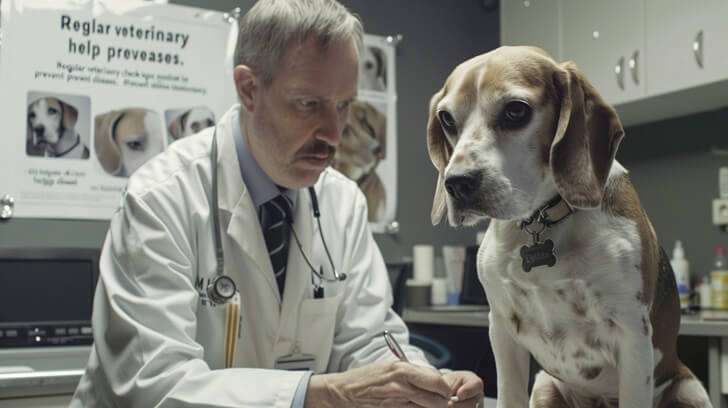
As our beloved canine companions age, their needs evolve, requiring us to adjust our care strategies to ensure they live their golden years comfortably and joyfully. Senior dogs often face a variety of health challenges, behavioral changes, and lifestyle adjustments that can significantly impact their quality of life. Understanding how to meet the unique needs of older dogs not only helps to maintain their health but also enhances their overall well-being. In this comprehensive guide, we will delve into the essential aspects of caring for senior dogs, focusing on medical care, nutrition, and daily activities that contribute to their happiness and health. By the end of this article, you’ll be equipped with valuable insights and practical tips to help your furry friend thrive in their later years. Plus, we’ll highlight the “Dog Trainer Bible,” a resource that can further assist you in providing the best care for your senior dog.
The Importance of Caring for Senior Dogs
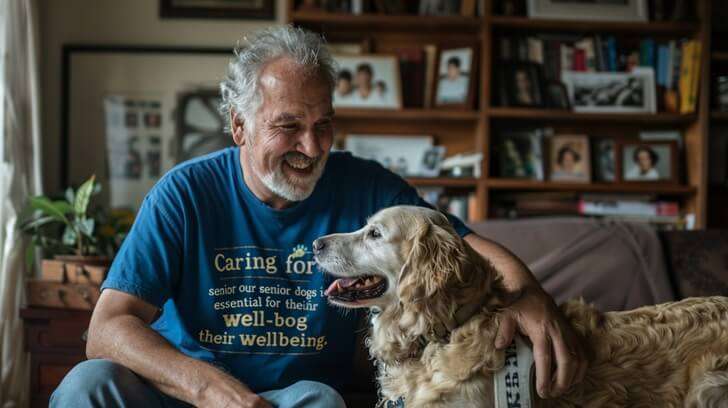
Caring for senior dogs involves more than just providing food and shelter; it requires a comprehensive approach that addresses their physical, emotional, and mental needs. Here are several compelling reasons why focusing on the quality of life for older dogs is essential:
1. Health Maintenance
As dogs age, they become more susceptible to various health issues, including arthritis, heart disease, dental problems, and cognitive dysfunction. Regular veterinary check-ups, including blood tests and screenings, play a crucial role in early detection and management of these conditions. Preventive care can help mitigate health issues before they become serious problems, thus extending the lifespan and improving the quality of life for your senior dog.
2. Nutritional Needs
Senior dogs often require different dietary considerations compared to younger dogs. A balanced diet specifically formulated for older dogs can help manage weight, improve digestion, and support overall health. Foods rich in antioxidants, omega fatty acids, and high-quality protein are beneficial for senior dogs. Proper nutrition plays a vital role in maintaining their vitality and preventing obesity-related diseases, which are common in older pets.
3. Enhanced Comfort
Older dogs may experience joint pain, stiffness, and other age-related discomforts that can hinder their mobility and overall comfort. Providing a comfortable living environment, including orthopedic beds and easy access to food and water, is crucial in enhancing their comfort levels. Simple adjustments in your home can make a significant difference in your dog’s quality of life.
4. Mental Stimulation

Just as physical health is vital, mental health is equally important for senior dogs. Engaging them with puzzle toys, training exercises, and social interactions can help prevent cognitive decline and promote mental well-being. Keeping their minds active and stimulated can reduce anxiety and boredom, contributing to a happier, healthier dog.
5. Emotional Bonding
Spending quality time with senior dogs strengthens the bond between pet and owner. This emotional connection is crucial for both parties, as it fosters happiness and reduces stress. Engaging in activities that both you and your dog enjoy not only enhances their quality of life but also creates cherished memories.
Practical Steps for Caring for Senior Dogs
To ensure your senior dog thrives, consider implementing the following practical steps into their daily routine:
1. Regular Veterinary Visits
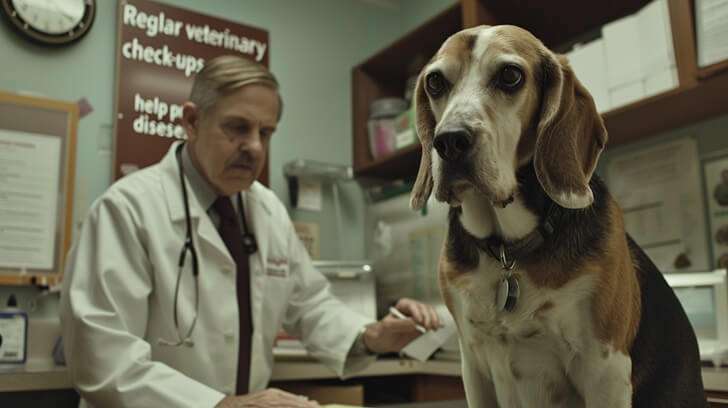
Schedule bi-annual check-ups to monitor your dog’s health. During these visits, discuss any behavioral changes or physical signs of discomfort with your veterinarian. Regular health assessments can help identify potential issues early, allowing for timely intervention. Discuss vaccination schedules, dental health, and any necessary tests that can provide insights into your dog’s health.
2. Tailored Nutrition
Switch to a high-quality senior dog food that meets the specific needs of older dogs. Look for formulas that are rich in antioxidants, omega fatty acids, and appropriate protein levels. Always consult your vet before making dietary changes, as they can provide guidance tailored to your dog’s specific health conditions and dietary needs. Additionally, consider the option of home-cooked meals, ensuring that they are nutritionally balanced and appropriate for your dog’s age and health status.
3. Weight Management
Monitor your dog’s weight closely, as obesity can lead to various health problems, including diabetes and joint issues. Adjust portions accordingly and consider using a measuring cup to ensure accurate feeding. Incorporating a feeding schedule and sticking to it can help maintain a healthy weight. If your dog struggles with weight loss or gain, consult your veterinarian for personalized advice and strategies.
4. Regular Exercise
Maintain a routine of gentle exercise that is appropriate for your dog’s age and physical condition. Short walks, play sessions, and light activities can help keep your dog physically active and engaged without overexerting them. Pay attention to your dog’s energy levels and adjust the intensity and duration of exercise as needed. Engaging in activities such as swimming can also provide low-impact exercise that is easy on aging joints.
5. Comfortable Living Space
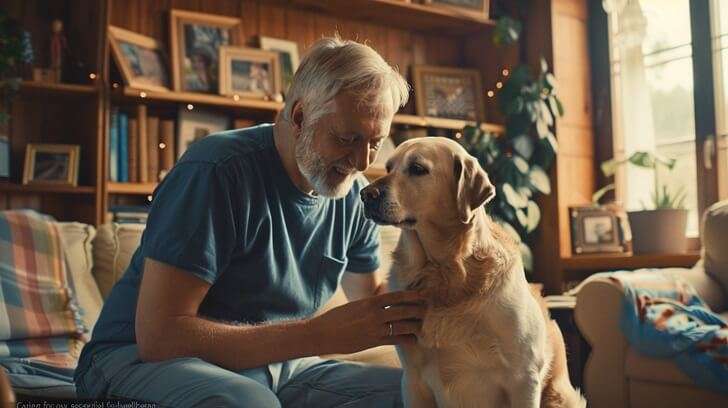
Ensure your dog has a quiet, comfortable place to rest. Provide orthopedic beds that support their joints and make it easier for them to get up and lie down. Create a safe environment by removing obstacles that could lead to slips or falls. Adding ramps or steps can help your dog access their favorite spots without straining their joints. Also, consider the temperature of your home; older dogs may be more sensitive to extreme temperatures, so providing a comfortable environment is essential.
6. Mental Stimulation
Incorporate interactive toys, treat puzzles, and training sessions into your dog’s routine to stimulate their minds. Activities like scent work, hide-and-seek, and gentle training exercises can help keep their minds sharp and engaged. Regular social interaction with other dogs and people can also provide mental enrichment and reduce feelings of isolation.
7. Hydration
Always provide fresh, clean water for your senior dog. Dehydration can lead to serious health issues, especially in older dogs, so encourage them to drink regularly. Consider investing in a pet water fountain, as many dogs prefer running water and are more likely to drink enough when it’s readily available.
Common Mistakes to Avoid When Caring for Senior Dogs
While caring for senior dogs, pet owners often make common mistakes that can affect their pets’ quality of life. Here are a few to be aware of:
1. Ignoring Health Symptoms
Many owners underestimate the significance of subtle changes in their dog’s behavior, such as decreased appetite, lethargy, or changes in bathroom habits. These could be signs of serious health issues. Always consult your veterinarian if you notice any changes, as early intervention can be crucial in managing health problems.
2. Neglecting Dental Care
Dental health is often overlooked, but it’s critical for senior dogs. Poor dental hygiene can lead to infections and other health problems. Regular dental cleanings, along with at-home dental care, such as brushing and dental chews, can help maintain your dog’s oral health and prevent complications.
3. Inadequate Exercise
Some owners believe that older dogs don’t need as much exercise, but they often still require regular physical activity to stay healthy. Adjust the intensity and duration of exercise, but don’t eliminate it completely. Providing opportunities for gentle play and exploration is essential for their physical and mental health.
4. Overfeeding or Underfeeding
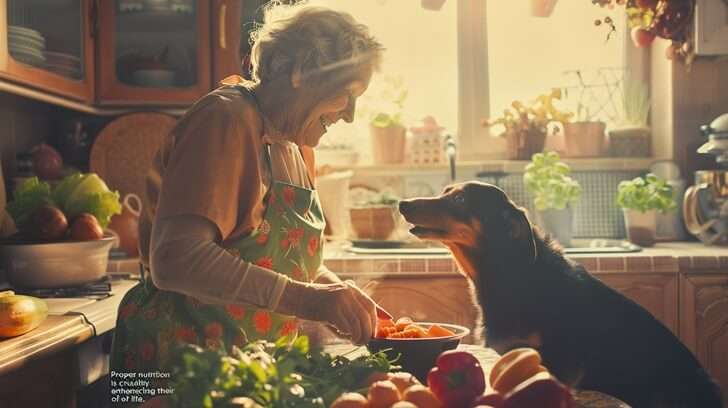
As dogs age, their metabolism slows down, requiring adjustments to their diet. Overfeeding can lead to obesity, while underfeeding can result in malnutrition. Consult your veterinarian for guidance on the best feeding plan for your dog’s age, weight, and health condition.
5. Failure to Provide Mental Stimulation
Older dogs still need mental challenges to stay engaged and stimulated. Lack of stimulation can lead to behavioral issues, cognitive decline, and anxiety. Incorporating interactive toys, games, and training sessions into their routine can help keep their minds active and improve their overall well-being.
Scientific Backing for Senior Dog Care
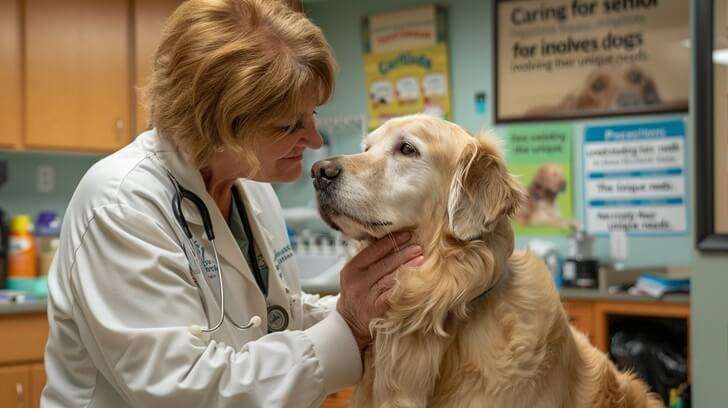
Research supports the importance of comprehensive care for senior dogs. Studies have shown that regular veterinary care, appropriate nutrition, and mental stimulation can significantly improve the quality of life for older dogs. For instance, a study published in the Journal of Veterinary Internal Medicine found that dogs receiving regular health assessments had a longer lifespan than those who did not. Additionally, research from the American Journal of Veterinary Research demonstrated that tailored nutrition can help manage age-related health issues, promoting better overall well-being. These findings highlight the importance of proactive care in ensuring that senior dogs remain healthy and happy.
Conclusion
Caring for senior dogs is a rewarding responsibility that requires commitment and knowledge. By understanding their unique needs and implementing practical strategies for their health, nutrition, and overall well-being, you can significantly enhance your dog’s quality of life. Remember, the goal is to ensure they remain comfortable, happy, and engaged during their later years. Start today by evaluating your dog’s care routine and making adjustments that can lead to a longer, healthier life.
In addition, for those looking to deepen their knowledge and skills in dog care, we highly recommend the Dog Trainer Bible. This comprehensive guide offers invaluable insights and techniques for dog training, behavior management, and care strategies that will benefit both you and your furry friend. Embrace the journey of caring for your senior dog, and together, create wonderful memories during these precious years.
